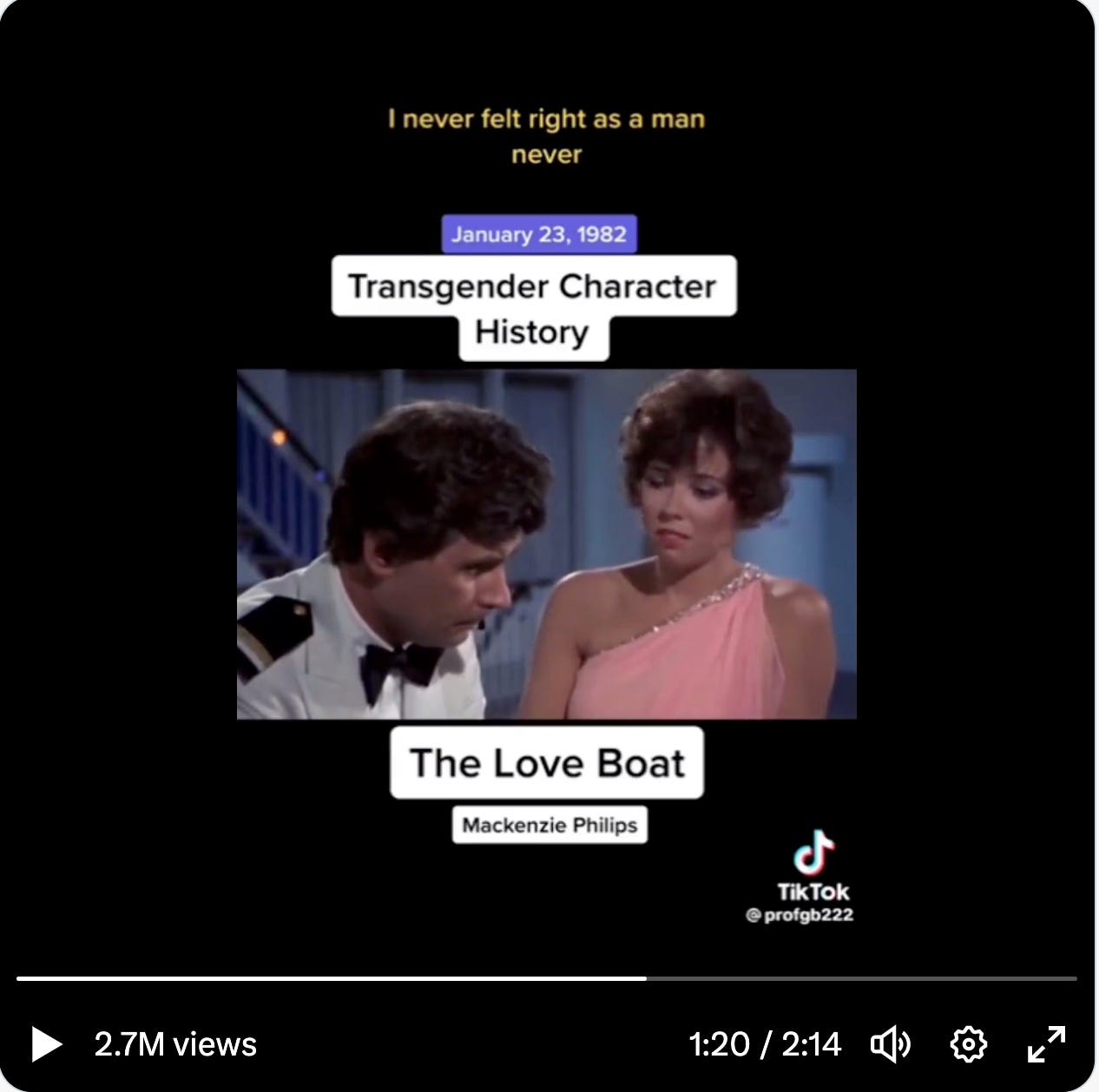I had never heard of Dylan Mulvaney. As involved as I am on Twitter, Facebook, and SubStack, I’m pretty oblivious to Instagram, SnapChat, YouTube, and a host of other sites that the young folks (younger than me) pay attention to.
Apparently, she1 had been posting regular updates on her social media accounts as she transitioned. In response to her one-year mark of these posts, Bud Light2 made a beer can (which wasn’t for sale) and sent it to her and she shared it on her socials. These facts all came to my attention only because Kid Rock decided to make a video (not linking) denouncing her and Anheuser-Busch while shooting up cans of Bud Light. This was followed by another guy (I forget who and it’s not important) buying cases of Bud Light so he could drive his very manly truck over them.3
I wrote late last year about how paying attention to individual stories of trans folks was important as opposed to responding in some abstract fashion. Taking the abstract approach allows legislators to pass restrictive laws banning hormone therapy for minors and criminalizing doctors or parents who advocate for gender change. It allows critics to make up words like “transgenderism”, turning a personal trauma into some kind of ideological statement — as if someone would undergo hormone treatments or even surgery just to make some political point.4
Looking instead at personal stories means that we have to confront the reality of gender dysphoria. I remember the case of a faculty member at a Christian University over a decade ago who wanted to transition. The provost, who was a psychologist, admitted that this was a case of gender dysphoria with the standard psychological concomitants, yet let the faculty member go anyway.
When critics say there is no such thing, I’m reminded of Isaac Sharp’s chapter on Gay Evangelicals in The Other Evangelicals. For a long time, evangelicals put stock in reparative therapies arguing that homosexuality was reversible with the right counseling. One by one those ex-gay ministries fell apart. I think that the critics have settled on a similar solution when it comes to their anti-trans stances — that somehow denying it will make it go away. It won’t.
I have long-time friends who are now trans women. One went to church with me. Another served in local government with me. I know the motivation of this case — she made the decision based on her long term depression and suicidal ideation.
I have former students who are now trans men. In two cases, I’ve seen them before and after transition and seen the shift in confidence and strengthened identity. The other case is noteworthy because he transition as a commuter student at a college where I was a senior administrator. The faculty nominated him to be a commencement speaker, because his journey at the college was so compelling. I’m sad to say that I worried more about what the public reaction might be.
That last point points out another challenge to the anti-trans sentiments out in the public sphere. Who would have known of that student’s journey if he didn’t tell them? This was brought home to me earlier this year when I bought a book by a political sociologist. It was only in reading the acknowledgements section that I saw him thank those who stood with him as he transitioned.
Last week, Zooey Zephyr had her speaking privileges revoked by the Montana legislature for “being disruptive” in ways similar to what happened in Tennessee5. She had been speaking from personal experience against anti-trans legislation under consideration. It was known that she was the first trans legislator ever in Montana.
But what if she hadn’t advertised that fact? How many people do we come across in our daily lives that have transitioned in the past and we just don’t know about it? Our interactions with them seem “normal” based on their current gender status. And that’s as it should be.
The Washington Post had a story this weekend reporting on a poll taken late in 2022 on attitudes toward trans issues. The results should be taken with a grain of salt as the subgroup margins of error are higher than the +/- 4% listed for the survey as a whole. It’s also with noting that the Post notes that it “is not clear how the surge of anti-trans bills will affect public opinion or whether new laws targeting drag shows and gender-affirming care for adults will be popular.” Overall, respondents are opposed to discrimination based on trans status but are more conservative when it comes to the treatment of minors.
Again, I would argue that respondents are reacting to the abstractions of trans issues and not any actual people they know. And, as this testimony suggests, there are sources trying to keep the focus away from real individuals:
Alyssa Wells, 29, a behavior therapist in Daytona Beach, Fla., who participated in the Post-KFF survey, said her views have changed on this issue in recent years as she has learned more, chiefly from Christian podcasts.
“At first I was on the side of acceptance, like using the pronouns and stuff, because I want people to be kind to each other. I don’t want people fighting all the time,” she said. But she has come to see things differently. “My concern with transgender is mostly with the children.”
Here’s one other surprising example of how looking at individual stories instead of abstraction changes our calculations. It comes from a very unlikely source: The Love Boat.
This showed up on Twitter last week as I was organizing my thoughts for this newsletter. The plot, from 1982, is that Gopher’s long-term college roommate is now a trans woman. It’s worth watching the entire clip, especially the part where Gopher upbraids Captain Stubing for his lack of compassion.
Captain Stubing is taking the abstract view of the situation. Gopher empathizes with his long-time friend and sees the transition as it is — a challenging life choice made after years of struggle — and finds his friend is still there.
When The Love Boat is a better model of Christian compassion than a bunch of Christian podcasts, we should all be ashamed.
If you’re offended by pronouns, you might want to skip today’s newsletter since I’m using the preferred post-transition pronoun of all individuals.
I don’t drink Bud Light because I’m a snob.
It’s always amazing that when conservative activists engage in stunts like this they have to buy the product from the offending company. I’m hoping that when my book eventually comes out that folks will hate-buy lots of copies so they can destroy them on video!






Thank you so much, John. Powerful and beautiful.
John-I am so grateful for your insight. Thank you for writing honestly and vulnerably.